Meaningful Work
Give Yourself a Break
If you’ve set goals or made plans and haven’t exactly followed through on them, give yourself a break. Beating yourself up isn’t going to deliver your achievement.
There are all kinds of reasons why progress slows down and sometimes comes to a stop. Maybe your immune system is lowered by the cold and flu season or because of extra stress in your life. Maybe you’re going through a challenge or transition and you have less energy than normal.
You could power through the fatigue and stress – for a while. Eventually your body will overrule your ambition and you’ll find yourself with less energy and strength than you had in the first place.
Instead of blaming yourself for not powering through your body’s requirement for rest, you could choose to accept it. It is only a temporary phase, after all. You could choose to acknowledge what is happening: “I am tired and have less energy. I need extra rest.” Then, you could allow yourself a break while you regain your strength.
This is not laziness. It is demonstrating self-awareness and self-value by placing your health among your highest priorities.
You may have created a deadline in your mind, or hoped for an achievement by a certain timeline. However, your body has its own reactions to your external environment, and its own ways of gauging what your mental, physical and emotional status is.
As a personal example, early this autumn I hired an editor to refine my manuscript. When she sent back her recommendations, I was excited and planned to finally finish my book within a month. Then my cat died, my business demanded extra attention and I had unexpected stressful events to deal with.
I wanted to work on my book. I’m so far past the time when I thought it would be published that I’m embarrassed when people ask me if it is available for purchase yet. Despite my wants and my ego, I decided to listen to my body when it told me I needed a break. I cut back on my obligations, slept a lot more, and stopped thinking about my book.
Two and a half months went by – not my ego’s timeline, but my body’s. Then I was ready to pick up my manuscript again.
As it turns out, putting it aside for a while made editing easier than in the past. I looked at my writing with a fresh perspective. I came up with a method of giving myself a small editing assignment each day that followed the same pattern. I keep a running list of each assignment on a piece of notebook paper and write “done” next to each task when I’m finished. Then I jot down the next assignment.
I wonder how much better my editing is now than if I had tried to force myself to do it when my mind and my energy weren’t ready?
I hope that you are full of good health and making progress in the areas of your life that make you happy. If not, maybe it is time for a break. A break without self-judgment or letting your ego make you feel disappointed. Maybe it is time for a healthy, restful break that you will emerge from better than ever.
The Success Stories We Don’t Read About
My friend sent me this link to a Malcolm Gladwell article that discussed the differences between early geniuses and late bloomers. It is nice to see a nod to the people who have worked hard at their professions for many years, and finally attain the level of success they dreamed of.
I liked this article. I also think that the media’s love of the big success stories leaves out a lot of inspiring people.
There are other ways of looking at career success beyond the young genius and the older achiever. Some people might be successful in multiple parts of their work life from youth to old age.
That success might be in the form of earning millions of dollars, or by introducing a product or service that positively impacts a large group of people. The success might be satisfaction from achieving a high level of skill in topics they are passionate about. Maybe it is pride in taking a career risk that improved the quality of their lives. It might be a feeling of contentment from diligently pursuing work that allows them to support family members.
I would like to read inspiring news stories that feature the success of people who do well but aren’t famous and didn’t generate top hits in their fields.
Thinking about success more broadly leaves room for people that have patchwork careers or successive careers in different areas. Without a single-minded focus they probably won’t be among the highest level of experts in a field and may or may not have a lot of earnings, but they amass a breadth of knowledge and skills and may be successful in many other ways.
So here’s a shout out to all the people who work hard to achieve their own definition of success. Cheers to your achievements!
You really can go after what you want in life and get it
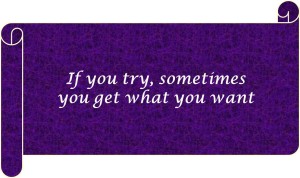 This evening as I was leaving my client’s office, I ran into a friend that I hadn’t seen for a few years. She asked how my life has been since I quit my job in the summer of 2013. I gave her the highlights of going to the Jack Kerouac School for a month of writing classes, starting a business that didn’t work out and then doing consulting work and realizing I love it.
This evening as I was leaving my client’s office, I ran into a friend that I hadn’t seen for a few years. She asked how my life has been since I quit my job in the summer of 2013. I gave her the highlights of going to the Jack Kerouac School for a month of writing classes, starting a business that didn’t work out and then doing consulting work and realizing I love it.
She expressed how glad she was that my career has gone well for me in the last year and a half and I was touched that she was happy for me. She said something else, though, that made a big impression. She said, “You are proof that people really can go after what they want in life and get it.”
My career isn’t perfect. Finding great clients can take time and be nerve wracking. Running my own business comes with a whole set of accounting tasks, licensing and taxes that I didn’t have to deal with when I was a full time employee.
And yet.
I went after what I wanted in my work life and got it. More flexibility and autonomy. Less bureaucracy. More enjoyment of my day-to-day work life. Less stress. More opportunities to use my skills set and keep learning.
You really can go after what you want in life and get it.
Why I’m Not Planning For The Year Ahead and Using My Three Best Productivity Tips Instead
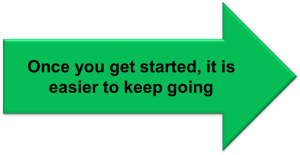 Each December and January I receive dozens of emails from productivity experts, and coaches and authors who write books about how to achieve your goals. They each recommend a system for setting goals for the new year ahead.
Each December and January I receive dozens of emails from productivity experts, and coaches and authors who write books about how to achieve your goals. They each recommend a system for setting goals for the new year ahead.
Last year I sifted through these choices and decided to use a comprehensive Word document planner. As I wrote my answers to the questions provided, I listed the focus areas of my life, my values, what I care about, how I want to feel and the skills I enjoy using. Then I made a table in my word document and listed my goals in the first column. Then I matched each of the other areas that I’d identified (values, what I care about, etc) with that particular goal.
Then I identified how I use each hour of the day vs. how I want to use each hour of the day, how I will work towards achieving my goals in each month of the year, and on and on. The entire document was eight pages. I was very serious about it, and it took me three days to complete it.
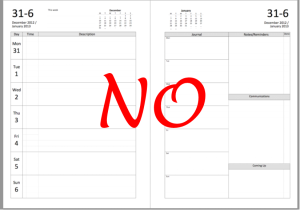 And then I never looked at it again until I opened the file to start writing this blog post.
And then I never looked at it again until I opened the file to start writing this blog post.
Almost immediately after I completed the planning document, I regretted that I wasted three days planning out my year instead of getting to work on the projects that I already know are most important to me. I didn’t need to list them on paper.
As I look back at the year that has past, that planning document didn’t help me at all.
Most of my goals turned out just fine. I launched my consulting company and am happy with the results of my first year in business. I took care of my health and my relationships. I launched my blog.
However my biggest goal was also my greatest challenge throughout the year: editing my book and preparing it for publication. The challenges are that it takes intense focus, a block of time to get my head into the work, energy and alertness, and what is often the toughest part: making my way to my office chair to open the document and get to work. Although I worked on it throughout the year, I’m frustrated that I still don’t have an agent-ready manuscript.
This year I am not filling out any annual planning worksheets or setting goals beyond using the best techniques that helped me move my book forward.
In order of the success I had with them, my tips for achieving goals are:
- Creating the smallest habit possible and then committing to repeating it every single day no matter what. For me, this was opening my word document and editing one sentence every day. Making the commitment was enough, but I sometimes used “The Chain Habit”, where you mark on a calendar each day that you complete your goal.
- Allowing other people to push you forward. This isn’t always pleasant. It can feel a little like bullying. But nudges from other people got me to reach out to the one editor that I wanted to work with. She accepted my project and I was thrilled with her edits and suggestions.
- Using self-talk to motivate yourself. Most of us learned in science class that a body in motion is likely to stay in motion and a body at rest is likely to stay at rest. So when I feel inertia, I tell myself that I just have to get started by opening my word doc. Once I get started, everything will be easier.
Whether you enjoy creating detailed plans for the year ahead or reject the whole concept, I wish you the best of luck in achieving your goals this year.
Choose Your People
Seth Godin recently posted a blog asking business people to consider what kind of customers they want. He expanded that to include other people like backers, members, and vendors and had a list of adjectives ranging from loyal to litigious.
The same thinking can be applied to any relationship. Focusing on business:
- What kinds of coworkers do you want to collaborate with?
- What kind of manager do you want to take direction from – or what kind of employees do you want to delegate to?
- What kind of company leaders are you willing to align yourself with?
Listing adjectives is a great way to identify what is important to you about the people you will interact with in business. Work satisfaction isn’t just about the job responsibilities, salary, location and hours. Think of how happy you can feel when you have a positive connection with the people you engage with, and how miserable you can feel when your personalities, work styles or values clash.
I think Godin’s most important point is that you have some choice and influence over the type of people you work for and with. If your management makes unreasonable demands of you, can you assert your boundaries without being punished or fired? If not, that doesn’t sound like a great place to work. As an entrepreneur, if you value signed contracts defining your scope of work and payment terms but your customers balk, maybe those aren’t the right customers for you.
To an extent, people learn how to treat you based on how you interact with them. If you put up with bad behavior, you’re teaching the offenders it is ok to treat you that way. If you react calmly and with an open mind when someone brings a conflict to you, you teach them that they can bring difficult issues to you without fearing your reaction.
Who do you want to work with? And how are you teaching them to treat you?
What I Learned About Business from Improv Acting Class
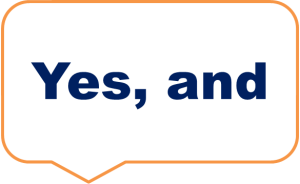 A few months after I quit my corporate job, I signed up for an eight-week improv acting class. We met for two and half hours on Wednesday evenings at a community center where we practiced improv techniques. I realized that much of what we learned applies to business.
A few months after I quit my corporate job, I signed up for an eight-week improv acting class. We met for two and half hours on Wednesday evenings at a community center where we practiced improv techniques. I realized that much of what we learned applies to business.
Three improv lessons are especially useful:
- Yes, and
- Commit
- Know When to Exit
Yes, and
In improv, this means you go with the direction your improv partner has started in order to keep the scene going. Cooperating and adding to the foundation that your partner set is what builds the story line and keeps the momentum going.
In business, if you were taught best practices in brainstorming sessions, you have already learned this. What it means is that when someone makes a suggestion, you say “yes” and then add your idea about how to make it even better. That way, whether you think their idea has merit or not, you’re keeping the positive flow of ideas coming and contributing in a positive way.
Commit
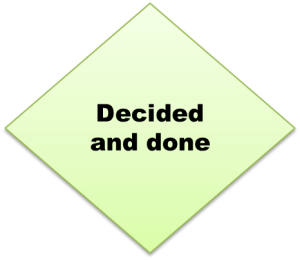 In improv, once you enter the scene as a space alien coming to kidnap Santa Claus, you talk and act like a space alien on a mission to get Santa. If you get embarrassed and limp through your scene, it isn’t going to be enjoyable for you or the audience. If you decide you don’t want to be a space alien and try to change to something else, then you’re screwing up the scene for your partner who is playing Santa.
In improv, once you enter the scene as a space alien coming to kidnap Santa Claus, you talk and act like a space alien on a mission to get Santa. If you get embarrassed and limp through your scene, it isn’t going to be enjoyable for you or the audience. If you decide you don’t want to be a space alien and try to change to something else, then you’re screwing up the scene for your partner who is playing Santa.
In business, this boils down to deciding what your objective is, how you are going to execute upon it and then doing it. Being unclear about your objective confuses the people who need to take action. Changing tactics midway through projects wastes time and money.
Know When to Exit
In improv, sometimes an actor says a great line that is a perfect finish to the scene. The audience laughs and everyone recognizes that it’s complete. That is the time to exit and let the next scene begin fresh. Any added words or actions after that point dilutes the powerful impact that was made and it becomes less funny.
Another time to exit the scene in improv is if the scene isn’t going anywhere, it is dragging on, and the players can’t seem to fix it. The best thing to do in that case is wrap it up and move on to the next scene.
In business, there are many great applications to this lesson. You’ve won the client’s business: now shake hands and get out of their office. You’ve agreed upon next steps in the meeting: close up the laptops and get back to work. You had a great success with a product promotion that has now ended: take the lessons learned and move onto the next promotion.
And in the case of the project not going anywhere…knowing when a product or program is not viable is much more valuable than trying to force it to happen. Accept the sunk costs and move on.
This can also be applied to a job. When it becomes clear that your job is not going the way you need it to, making the decision to exit could be the best way for you to bring the scene to a close on your own terms.
Two Tips For When You Feel Stuck at Your Job
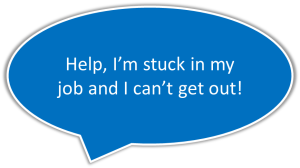 When you feel stuck in a job, you can get tunnel vision that focuses on what isn’t working.
When you feel stuck in a job, you can get tunnel vision that focuses on what isn’t working.
When you feel trapped because your salary pays the bills and provides health insurance, and gives you the means to support people who depend on you, it can seem like there aren’t very many good options. You may reject ideas about how to improve the situation or not have any ideas in the first place.
When you’re working in a job that isn’t right for you, it is draining. It is typical to feel overwhelmed and exhausted. On top of that, if you’ve been in an environment where you’ve been frequently criticized and your contributions haven’t been valued, it is common to lose confidence in your abilities.
I’ve had people tell me that they were so discouraged at work that they actually preferred being at home sick with the flu to going to the office!
This isn’t a good emotional state to begin creating a better job or work environment! But the truth is that there are many possible ways to improve work situations. It is just harder to access those possibilities when your perspective is narrowed by fear and discouragement.
One way to remind yourself that you do have options is to make a list of all the ways that your work situation can improve. This is a brainstorming-style list designed to open your mind, so including things that don’t seem realistic is actually a good idea. Things like, “My boss gets fired and a great new manager takes over the department,” or “A friend at another company recruits me to join his staff.” Or even, “I quit my job and go back to school to become a naturopathic doctor.”
If you are more visual and prefer not to write lists, mind-mapping is a great exercise. Take a blank piece of paper and jot down a single word or short phrase that represents what you’re ideal job situation would be. Then draw lines to connect the words that have common themes, and soon you’ll see patterns emerge.
Lists and mind-mapping are great ways to broaden your perspective when you feel stuck. These exercises tap into the part of your brain that has unique ideas and flashes of insight. In the short-term, taking these actions can boost your attitude by reminding you that there are many possibilities to improve your job situation. Then, with a more open mind, you might decide to pursue one of your ideas or discover a new opportunity that you might not have seen before.
Might as well deal with your stuff now
If you use work to avoid what else in your life isn’t working and then you quit, or get laid off, or take a new job that doesn’t demand twelve hour work days, all of a sudden you’re going to be confronted with that stuff.
If you are so busy and distracted with work and your other obligations that you don’t notice all that stuff that you’ve been avoiding, it will be front and center in your life as soon as you have more time.
Think of all the people around you who complain about being too busy. Maybe you are one of them. If you weren’t too busy, then what would you complain about?
Your stuff will eventually catch up to you. When you start having more time, you have more time to think about damaged relationships, health concerns, financial chaos, or dreams that you put aside. Then what?
It can feel like doom and gloom, but it is actually an opportunity to get more of what you want in life. A little effort over a sustained period of time is how any great achievement is earned. Relationships can be repaired, greater health can be achieved, finance goals can be set, and dreams can evolve.
Might as well start now.
Do it Anyway
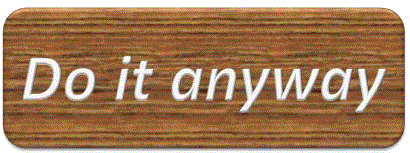 One of the students in my Emotional Intelligence class told our group about her childhood. She had tough experiences growing up, and continues to deal with challenging family issues. She talked about feeling overwhelmed at times.
One of the students in my Emotional Intelligence class told our group about her childhood. She had tough experiences growing up, and continues to deal with challenging family issues. She talked about feeling overwhelmed at times.
Her situation was unique, but I can relate to it. Don’t we all have something challenging in our pasts that we had to work to overcome? Don’t we all face situations from time to time that drag us down?
It’s what she told us next that stuck with me. She talked about volunteering with groups that help disadvantaged women and said she does it even when she feels sad. She contributes and gives support to others, even when she is grieving her own losses.
She felt sad and did it anyway.
A few days ago I read an article by Scott Dinsmore about fear. He talked about being paralyzed by doubt when he sat down to develop a new course. He talked about nearly cancelling a workshop that he had already advertised because when he tried to create the materials, he choked.
Then he wrote something really interesting. He said that when he completed those programs, he was proud of the way they turned out, and that he considers them the most significant work he’s ever done. Wow.
He was afraid and did it anyway.
This week I gave a short presentation to a local Rotary group, on the topic of preparing to quit a job. It was a great experience – the Rotarians were gracious and I enjoyed the chance to connect with them. Plus, it was fun to speak about what I’d learned from all those hours of research. But leading up to the event… I was tired!
I had some of the Scott Dinsmore-styled fear, and am still grieving the loss of my beloved cat. But what really threw me off balance were two weeks of personal mayhem. Unexpected events consumed much of the hours and energy that I planned to use on preparing for the talk. Instead, I was on edge and sleep deprived, but I chose to work through the fatigue to narrow my topic, review my slides with friends and rehearse.
I was tired and did it anyway.
It doesn’t mean that we should keep pushing ourselves nonstop. Now that my presentation is done, I’m resting more, drinking immune-system-building tea and scaling back on social events while I regain my energy.
I’m a big believer in giving ourselves breaks. I think we should overcome the pressure to operate like robots, and stop congratulating ourselves when we ignore the need to rest and recover. But there’s a difference between relentlessly pushing ourselves past healthy limits and taking on specific challenges that require extra effort. Sometimes a goal or activity is worth the exertion required to get past obstacles like sadness, fear and tiredness.
The next time I have a big opportunity in front of me, one that is worth going after, I’m going to acknowledge how I feel about it. I’m going to think of ways to maintain my health while I pursue my goal. And then I’m going to —
do it anyway.
Why it’s Smart to be Prepared to Leave Your Job on a Moment’s Notice
Whether you plan to quit your job now or never, it is smart to be ready to leave on a moment’s notice. It’s not about being fearful that you might lose your job. It’s about gaining confidence by being prepared.
Here’s why it’s important:
- Being ready to quit is like having a grab-and-go bag for your career. Tomorrow might be your last day at work whether you want it to be or not. Layoffs happen, businesses fail, companies relocate. Job security is more of a wish than a reality.
- You’ll be empowered. You’ll have options and will be less dependent on your employer to meet your financial needs and your personal career goals.
- You may be more successful at your job. Feeling that you can leave at any time, you might take smart risks that pay off. You might speak up more, and get more attention for your projects.
- You’ll be more agile. If you’re shoulder-tapped to transfer to a new role or new location, you can change gears quickly. Or you can say no and let the chips fall where they may, because you’re ready for it.
There are multiple components to being fully prepared that involve finances, health, shoring up support and more. If you don’t know where to start, take a look at your work tools. If you’re using a computer or cell phone provided by your employer, would you be ok if you were asked to hand them over tomorrow? If not, wipe all your personal photos, documents and data from your employer’s property. Stop using your company’s email address for personal communications. Make sure you have copies of your address book on your own computer and phone.
Another step is to make sure you’ve got copies of important information safely stored at home. This includes copies of your performance reviews and records of awards and achievements, so you can use that information to customize resumes in the future. It also includes having a portfolio of work samples that you can use in future interviews or as resources in your next role. Work samples could be snapshots of projects you worked on, non-confidential reports and presentations, or tangible materials that you produced. Make sure to take home financial documents like recent pay stubs and information about company-sponsored retirement plans and investments.
A third place to consider is your work space. Years ago my office was draped in personal belongings. I had two lamps, framed art on the walls, and a bookcase full of books, awards and photos. I even had hippie beads hanging from my door frame. (Don’t judge – people loved my office!) But when I left my office for the last time, I walked out with a single cardboard box of personal items. As I was working through my exit plan, I slowly swapped out the objects that were most important to me with fewer and more portable pieces. If you make this transition thoughtfully, nobody else will notice. But you’ll have the satisfaction of knowing you could hold your cardboard box in one hand while you use the other to wave ‘bye.


Recent Comments